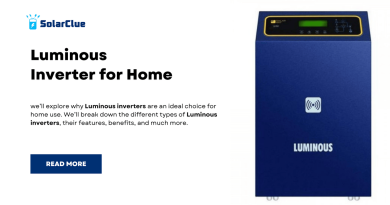How To Start A Solar Panel Business?
Starting a solar panel installation business can be a lucrative and impactful venture, contributing to the global shift towards sustainable energy. This blog covers essential steps from business planning to scaling for growth, ensuring you have the knowledge to build a successful solar business.
Table of Contents
- 1 Market Research and Business Planning
- 1.1 Legal and Regulatory Requirements
- 1.2 Financing Options for Your Solar Business
- 1.3 Building a Strong Sales and Marketing Strategy
- 1.4 Project Management and Installation Processes
- 1.5 Customer Service and After-Sales Support
- 1.6 Building a Skilled Team
- 1.7 Business Model Comparison
- 1.8 Establishing Partnerships with Suppliers
- 1.9 Exploring Different Business Models
- 1.10 Tips for Overcoming Challenges
- 1.11 Staying Updated with Industry Trends and Technologies
- 1.12 Scaling Your Solar Business for Growth
- 1.13 Conclusion
- 1.14 FAQ Section
Market Research and Business Planning
Market Research:
Understanding the demand for solar installations in your target market is crucial. Identify potential customers, analyze competitors, and assess the regulatory environment.
Business Plan:
Develop a comprehensive business plan outlining your business model, target market, financial projections, marketing strategy, and operational plan. This plan will guide your business and attract investors.
Legal and Regulatory Requirements
Licenses and Permits: Obtain necessary licenses and permits to operate legally. This includes contractor licenses, electrical permits, and environmental permits.
Certifications: Acquire certifications from recognized organizations like NABCEP (North American Board of Certified Energy Practitioners) to enhance credibility and customer trust.
Financing Options for Your Solar Business
Self-Funding: Use personal savings or assets to fund your business.
Loans: Apply for business loans from banks or financial institutions.
Investors: Attract private investors or venture capital.
Government Grants and Incentives: Explore government grants and incentives for renewable energy businesses.
Building a Strong Sales and Marketing Strategy
Branding: Develop a strong brand identity that resonates with your target market.
Digital Marketing: Utilize SEO, social media, and email marketing to reach potential customers.
Sales Team: Build a skilled sales team to generate leads and convert them into customers.
Project Management and Installation Processes
Project Management: Implement robust project management practices to ensure timely and efficient installations.
Installation Process: Develop a standardized installation process that includes site assessment, system design, installation, and quality assurance.
Customer Service and After-Sales Support
Customer Service: Provide exceptional customer service to build trust and loyalty.
After-Sales Support: Offer maintenance services, warranties, and performance monitoring to ensure customer satisfaction.
Building a Skilled Team
Hiring: Recruit skilled professionals, including electricians, engineers, and project managers.
Training: Provide ongoing training to keep your team updated with the latest industry standards and technologies.
Business Model Comparison
| Business Model | Target Market | Services Offered | Key Advantages | Key Challenges |
|---|---|---|---|---|
| Residential Solar Installations | Homeowners | Rooftop installations, battery storage, energy efficiency consultations | High demand, smaller projects | Customer education, pricing pressure |
| Commercial Solar Installations | Businesses | Large-scale installations, energy audits, system maintenance | Cost savings for businesses, large projects | Longer sales cycles, regulatory compliance |
| Utility-Scale Solar Installations | Utilities, corporations | End-to-end project management from design to commissioning | Large-scale impact, high profitability | Significant investment, complex regulations |
Establishing Partnerships with Suppliers
Supplier Relationships: Build strong relationships with reliable suppliers to ensure a steady supply of quality solar panels and equipment.
Negotiation: Negotiate favorable terms and pricing to enhance profitability.
Exploring Different Business Models
Residential Solar Installations
Market: Focus on homeowners looking to reduce energy bills and carbon footprint.
Services: Offer rooftop solar installations, battery storage, and energy efficiency consultations.
Commercial Solar Installations
Market: Target businesses aiming to cut energy costs and meet sustainability goals.
Services: Provide large-scale installations, energy audits, and system maintenance.
Utility-Scale Solar Installations
Market: Work with utilities and large corporations to develop large solar farms.
Services: Manage end-to-end projects from design to commissioning.
Tips for Overcoming Challenges
Regulatory Hurdles: Stay informed about regulatory changes and adapt quickly.
Competition: Differentiate your services through innovation and superior customer service.
Technology: Keep up with technological advancements to offer cutting-edge solutions.
Staying Updated with Industry Trends and Technologies
Continuing Education: Encourage your team to attend industry conferences and training programs.
Industry Publications: Subscribe to industry journals and publications to stay informed.
Scaling Your Solar Business for Growth
Expansion Plan: Develop a clear plan for scaling your operations, including entering new markets and expanding your service offerings.
Automation: Implement automation tools to streamline operations and improve efficiency.
Customer Base: Focus on customer retention and referrals to grow your customer base organically.
Conclusion
Starting a solar panel installation business requires careful planning, adherence to regulations, and a focus on customer satisfaction. By following this comprehensive guide, you can establish a successful solar business that contributes to a sustainable future.
Here at SolarClue®, we offer a smart, practical, and “beautiful” solution. You will be answered for all the questions related to Solar.
We provide all kinds of brands that are the Best Solar panels in India.
If you are the one who is planning for the solar power system. Don’t hesitate to contact our team!
Looking forward to empowering you with solar energy, just like hundreds of our other clients!
FAQ Section
1. What licenses are required to start a solar panel installation business?
Licenses vary by location but typically include contractor licenses, electrical permits, and environmental permits.
2. How can I finance my solar business?
Options include self-funding, loans, investors, and government grants and incentives.
3. What is the best business model for a solar panel installation business?
It depends on your target market; residential, commercial, and utility-scale models each have unique benefits.
4. How can I stay updated with industry trends?
Attend industry conferences, subscribe to journals, and provide ongoing training for your team.
5. What are the key challenges in the solar installation business?
Regulatory changes, competition, and technological advancements are common challenges.




